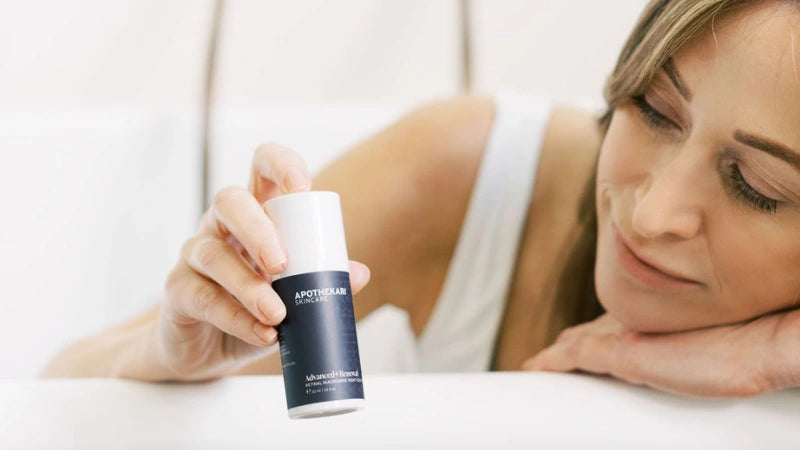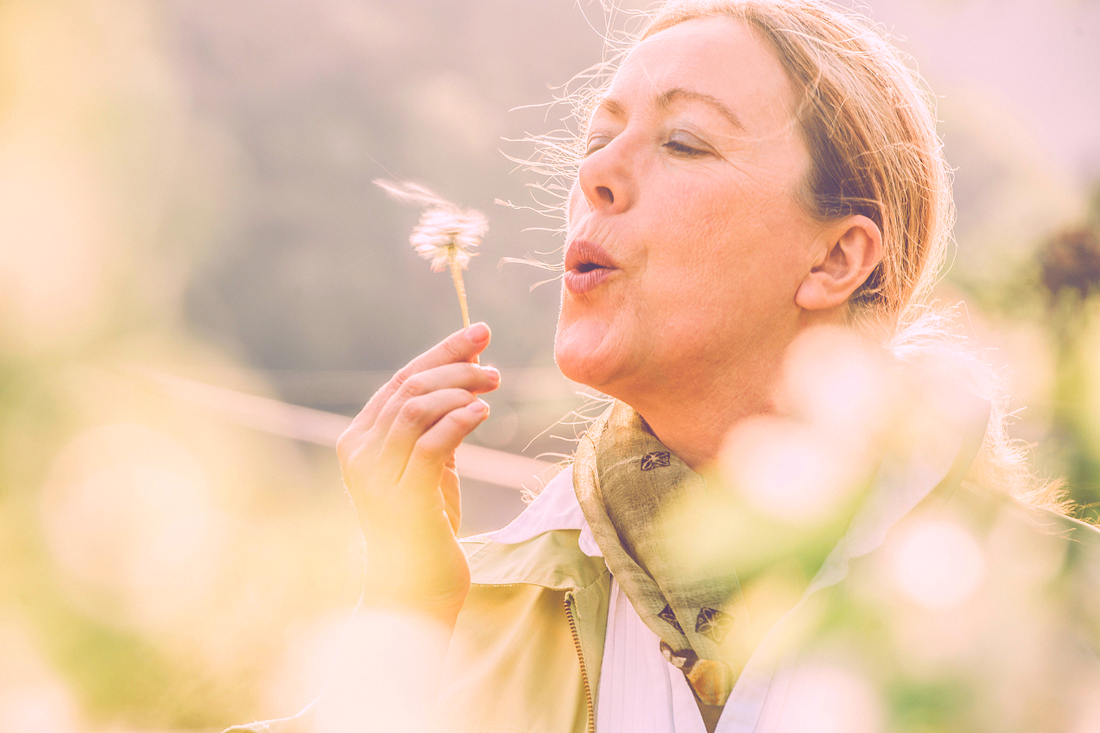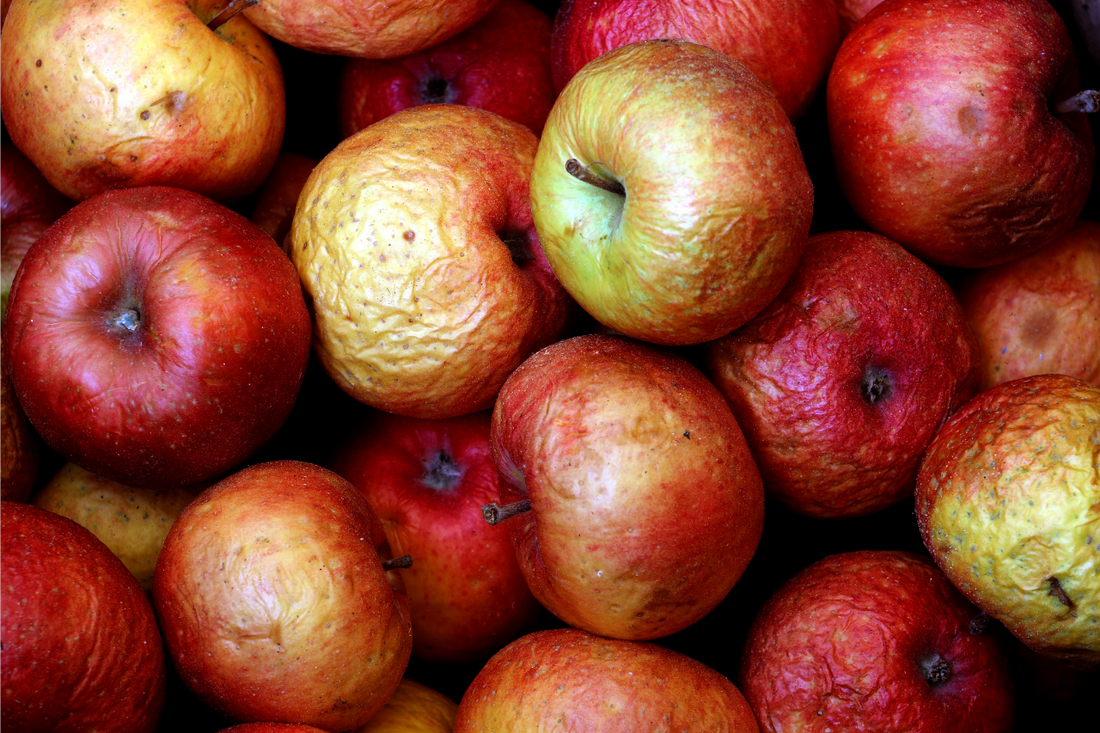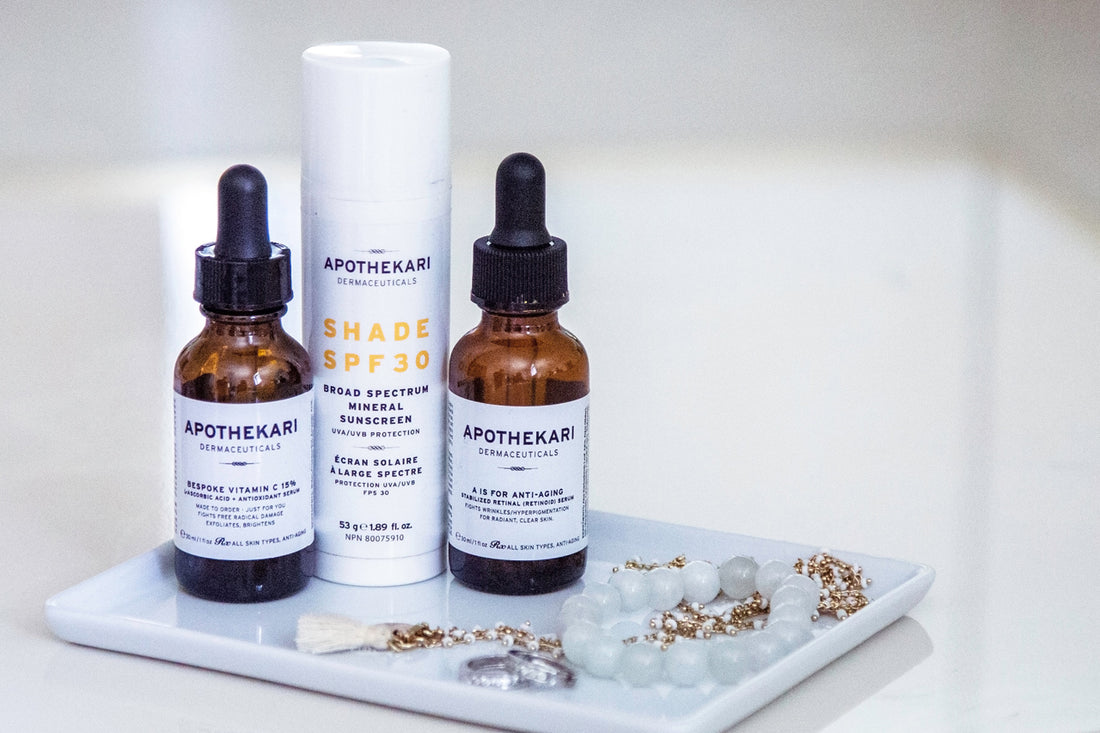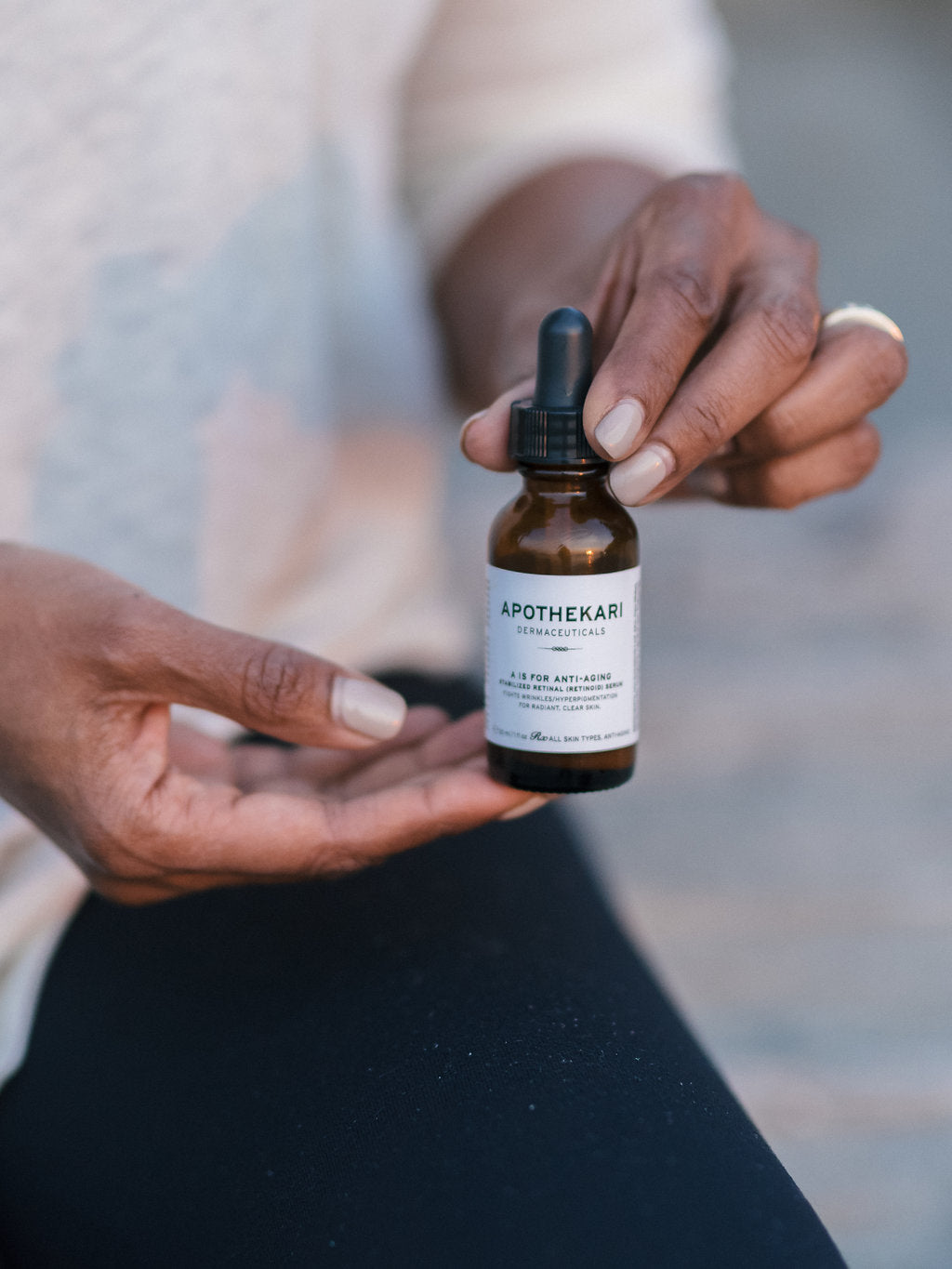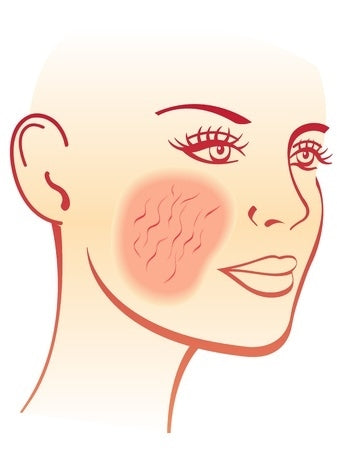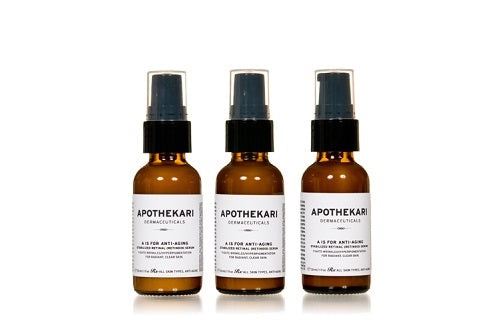Blog
Retinol & Retinoids: Your Complete Guide
You may be wondering if retinol (or another retinoid) has a place in your skin care routine. In this post we’ll explain why it’s important if you’re serious about healthy and beautiful skin. And, we’ll show you how to get this superstar ingredient into your life. Shop A Is for Anti-Aging Serum (Our Retinoid Formulation) Shop Active Eyes What is Retinol? Retinol is a form of vitamin A that you can find in skincare serums, creams and lotions, especially those marketed as “anti-aging”. Which is NOT a term we like to use around here, but which persists, nonetheless. (It’s why we’ve recently renamed our A is for Anti-Aging Serum to Advanced+ Renewal). It belongs to a class of ingredients know as retinoids, which are known for their ability to improve the appearance of fine lines, wrinkles, and uneven skin texture. And they’ve also been shown to be useful in the management of acne. Retinol may be the most well-known retinoid, but there are several others also used in skincare. Retinyl palmitate & Retinyl acetate. Very mild and gentle and available without prescription Retinaldehyde. Potent, but still gentle and found in our Advanced+ Renewal Serum. Available over the counter. Adapalene. Prescription only. Tazarotene. Prescription only. Tretinoin. Prescription only. Isotretinoin. Prescription only. Prescription forms tend to be stronger, and often more irritating to skin. If you feel you’re ready for one, your physician will be able to guide you towards the best option for your individual needs. What is Retinol Good For? As a class of ingredients in general, retinoids: Increase collagen production and decrease its breakdown, which minimize the appearance of fine lines and wrinkles along with scarring. Inhibit the production and transfer of melanin (skin pigment), which “prevents age spots from worsening and also helps to fade existing dark spots. Help unclog pores and minimize their appearance. Increase skin cell turnover, which helps replace old, dry, dead skin cells with younger, healthier ones. The result is that glow that we’re all after. Reduce transepidermal water loss, leaving skin looking more plump and hydrated. Retinol helps to improve the appearance and texture of skin. It diminishes the appearance of wrinkles and fine lines, smooths skin, fades age spots and hyperpigmentation and minimizes acne blemishes, so it’s a powerhouse ingredient to have in your skin care arsenal. Keep in mind that while retinol may be the most well known retinoid, that it’s not necessarily the best one. As effective as it is, it does come with some effects. What are the Negative Effects of Retinol? Retinol can result in some negative side effects, especially if it isn’t used correctly. Common side effects include redness, peeling, and dryness, which can be really disheartening when you start using it on a regular basis. Boo. Another way to minimize retinoid side effects is to start with a low concentration and gradually work your way up to a higher concentration. It’s also important to use retinol in combination with a good moisturizer and/or face oil to help prevent dryness and irritation. However, despite following good instructions on retinol use, you may still find your skin unable to tolerate it. In this case, you can opt for a more gentle retinoid, like retinaldehyde. Retinol vs Retinaldehyde Retinaldehyde—often simply called retinal—is retinol’s gentler, yet even more powerful cousin. And we’re BIG fans of this ingredient at Apothekari, which is why it’s included in our Advanced+ Renewal Serum, along with other actives. Retinal is also one step closer than retinol in converting to retinoic acid, making it more readily available for your skin to put it to good use. And, just like retinol, studies have shown that it minimizes the appearance of dark spots, fine lines and post-acne scarring. The kicker? It works just as well (possibly better than retinol), and with fewer side effects. It should be on everyone’s radar! What Does Retinol Do To Your Face? Once absorbed into your skin, it works by increasing the production of collagen. This helps to improve your skin’s appearance, especially by smoothing out wrinkles and fine lines. It can also increase skin cell turnover, which is why it’s useful in reducing acne blemishes and fading hyperpigmentation (age spots, etc). Can I Use Retinol Around Eyes? The skin around the eyes is thinner than skin on the rest of your face, and so quite prone to wrinkling. You absolutely can apply retinol and other retinoids around the eye. However, it’s important to be mindful as the thin skin results in greater absorption of ingredients and also has a higher potential for irritation. Using a low concentration product–including retinoid creams specifically formulated for the eye area–is a great option. They will contain either a lower concentration of retinoid, contain a gentle retinoid like retinyl palmitate or retinaldehyde; or include encapsulated retinol. Encapsulated retinol slowly releases retinol, rather than a big burst all at once, helping to minimize skin irritation. It’s an excellent way to treat the delicate skin around your eyes, where we’ve included it in our ActiveEyes Serum (along with peptides and other actives). Also remember to take the proper precautions, including using moisturizer to damp skin and sun protection. Is Retinol Good for Acne? Yes, it can absolutely help to treating acne. Because it increases cell turnover, this pushes newer, healthier skin cells to the surface, which in turn, prevents pores from clogging. It’s not always the most effective treatment for all types of acne, and if you find that it’s not working for you, check in with a dermatologist to find a better solution. How Do You Know if Retinol is Working? As with many skincare products, the impact of consistently using retinol and other retinoids can take time. You should allow at least 4-6 weeks before deciding whether it’s making a difference to your skin. Here are some signs that it may be working for you: Improved skin texture: The increase in skin cell turnover helps to smooth out bumpy and rough skin. Reduced fine lines and wrinkles: Collagen production is stimulated, which can help to reduce the appearance of fine lines and wrinkles. Brighter, more even skin tone: Improved skin tone by reducing the appearance of dark spots and hyperpigmentation. Fewer breakouts: Retinol helps to unclog pores, which reduces the frequency and severity of breakouts. When Should I Start Using Retinol? Most skin care experts advise starting retinoids in your late twenties, when the natural production of collagen and elastin in skin begins to decline. Introducing it earlier can help to prevent the signs of aging from appearing prematurely. Can I Use It Everyday? If you introduce it into your skincare routine gradually and aren’t experiencing any negative side effects (redness, irritation, peeling) then it’s perfectly safe to use it daily. However, we find that even if you introduce retinol gradually that it may cause skin irritation, especially if you have sensitive skin. The retinaldehyde in our Advanced+ Renewal Serum is not only more effective than retinol, it’s also more gentle, making it ideal for use in all skin types. In fact, many of our customers with sensitive skin are able to tolerate Advanced+ Renewal with great success after having their skin react to any other retinoid they’ve tried. Dos and Don’ts With Retinol? Do: Start with a low concentration of retinol and gradually work your way up to a higher concentration Use retinol at night. It is highly susceptible to damage when exposed to sunlight and it may also make your skin more sensitive to sun exposure. For this reason, make sure you’re apply sunscreen every day. Use a moisturizer to help prevent dryness and irritation Use consistently and be patient. It can take several weeks to see results Don’t: Use during the day as it degrades with exposure to sunlight and may also increase your skin’s sensitivity. Use if you are pregnant or breastfeeding Use in combination with other active ingredients like alpha hydroxy acids and low pH treatments without consulting a skincare professional. It’s generally safe to use them on alternate days. Use too much. Your skin can only absorb so much. Plus, this can lead to dryness and irritation Hope you enjoyed reading this!
Learn moreHow To Get More Radiant Skin
Glowy, radiant skin is a sign of healthy skin – a look that that we all aspire to. Consistently using the right combination of products is key to radiant skin. Learn more in this post. SHOP RADIANT SKIN SET What Robs You of Radiant Skin? Lack of sleep, stress, aging and even what you eat can rob your complexion of its radiance. Skin that looks dull and tired can become luminous and glowing by using the right products along with some expert tips. Here’s how to achieve radiant skin. 4 Tips for Radiant Skin Cleanse. Start with a clean ‘canvas’ by removing dirt including oil, pollution and make-up that can leave skin looking dull. Choose between two foaming cleansers to suit most skin types: AHA-Mazing Clean Cleansing Gel – Exfoliate, cleanse and hydrate with this foaming cleansing that soothes skin and senses. Triple combination of alpha hydroxy acids (AHAs) and a refreshing mint scent. Cloud Nine Foaming Cleansing Crème – Clean, moisturize and protect skin with this gentle, foaming cleanser. Rich with antioxidant and anti-inflammatory ingredients and ideal for aging and sensitive skin. Exfoliate. Nothing strips away your glow more than having a layer of dry, dead skin cells sitting on your skin’s surface. Exfoliation helps to remove these cells and brightens skin almost immediately. You can exfoliate physically with a scrub or chemically with an acid. When it comes to facial exfoliation, we lean towards chemical exfoliation, which only penetrates through the skin’s uppermost layer. Scrubs and polishes are more prone to aggressive use, which can lead to skin irritation. In addition to our AHA-Mazing Clean Cleansing Gel, which exfoliates and cleanses, our Bespoke Vitamin C Serum, provides light exfoliation. Brighten. As we age, skin can become unevenly toned due to age spots, melasma, etc. The following ingredients can brighten skin: Niacinamide. Lightens skin discolouration and fades age spots by decreasing the number of melanin transferred to pigment-producing cells (melanocytes) to skin cells by more than half. Find niacinamide in A is for Anti-Aging, where it is combined with Phenylethyl Resorcinol, another skin brightening agent and retinaldehyde, for the ultimate in age prevention properties. Vitamin C. Found in our Bespoke Vitamin C Serum, it brightens skin by disrupting the production of melanin, a skin pigment that causes discolouration and age spots. Because the two ingredients above do so much to improve skin’s glow, we’ve combined A is for Anti-Aging and our Bespoke Vitamin C Serum into the Radiant Skin Set. When used together regularly, these serums will help to illuminate your complexion. Expect to see results within a few weeks and optimal results in about three months. Other ingredients that can help to brighten skin include lactic acid, arbutin, kojic acid and licorice. Hydrate. Dry and dehydrated skin looks dull and may even appear more wrinkled. Although you may not need a dedicated moisturizer, it’s important to incorporate products that can help to replenish and lock in moisture. In a previous post we discussed how to choose a moisturizer and our Daily Infusion Moisturizer provides a perfect balance of the 3 types of ingredients needed to keep skin hydrated. Fake It Till You Make It! While you’re waiting for results from topical treatment to kick in, you can rely on make-up, which helps to deliver an instant glow. Look for products that contain minerals like mica, which reflect light to deliver radiant skin allover.
Learn more3 Essential Skin Care Products for Summer
3 essential skin care products, found in our Anti-Aging Set, are important to protect and perfect skin this summer and year-round. (*Shade SPF 30 and our Anti-Aging Set have been discontinued. Our Radiant Skin Set includes the same 2 serums that were included in our Anti-Aging Set.) SHOP RADIANT SKIN SET Protect Skin & Prevent Damage Hands up if you love the sun! Sunshine and the sun’s heat make us feel good. The sun’s rays may be great for our mental health, but they’re not so kind to our skin. In fact, it’s estimated that unprotected exposure to the sun’s ultraviolet rays are responsible for more than 80% of skin damage. Regular sunscreen use along with topical antioxidants help to protect skin and prevent damage caused by the sun and our environment. Sunscreens, like Shade SPF 30 help to block the UVA and UVB rays that are responsible for sunburn and skin aging. Shade SPF 30 is a naturally safe, mineral-based zinc oxide sunscreen that offers broad spectrum, non-whitening sun protection and should be used every day, year round. Antioxidants work to protect skin from the free radicals that are generated by exposure to UV rays, pollution, smoke and other environmental factors. Free radicals are unstable molecules which harm skin and accelerate aging by destroying substances including collagen and elastin, proteins which are important to maintain youthful looking skin. Our Bespoke Vitamin C Serum is made to order and contains L-ascorbic acid plus additional antioxidants to not only protect skin, but also boost collagen production, brighten skin and moisturize. Essential Skin Care Products To Perfect Skin While preventing skin damage is the first step in keeping skin healthy, it’s also important to support skin with treatments that help to repair and perfect it. This is where retinoids come in. Retinoids, like retinaldehyde, found in our A is for Anti-Aging Serum, work by ‘turning on’ genes and cells that are involved in collagen production. Used regularly, this essential skin care product can help to reverse sun damage and promote healthier skin including: Reduce the appearance of wrinkles and fine lines Brighten skin Increase skin moisture content and soothe skin irritation Assist in management of acne and blemishes (retinaldehyde has antibacterial activity) A bonus of A is for Anti-Aging is that retinaldehyde is an effective and gentle retinoid, making it suitable for most skin types. 3 Essential Skin Care Products in One Set Because these 3 products – a sunscreen, an antioxidant treatment and a retinoid – are fundamental to great skin, we’ve combined them into our Anti-Aging Set, which currently features a $40 gift certificate. Summertime Skin Care is Year Round Skin Care While we tend to focus on sun protection in the summer, it’s important all year. The sun emits more UVB rays during the summer (UVB rays are responsible for burning) but emits the same amount of UVA rays regardless of season. UVA rays penetrate deeper than UVB rays and are the ones responsible for skin aging including the risk of developing some types of skin cancer. Consider sunscreen the number one essential skin care product and use it every single day!
Learn moreBoost Collagen With This Face Serum
Boost collagen with Apothekari A is for Anti-Aging, a face serum that can help keep skin looking healthy and youthful. Shop A Is for Anti-Aging Serum (Our Retinoid Formulation) What is Collagen? Collagen is the protein most abundant in mammals and it’s behind pretty much everything holding you up right now – your bones, skin and muscle. Collagen is made up of amino acids, the building blocks of protein, which give strength and structure to tissues. This allows us to remain bendy, bouncy and generally supple. It’s one of the main components of skin but we sadly start to lose collagen as early as our twenties. Over time, this can lead to fine lines, wrinkles, sagging and loose skin. Fortunately, we can help to boost collagen levels with a combination of factors including lifestyle changes, sound nutrition plus topical treatments including this face serum, A is for Anti-Aging. Sunscreen and antioxidants are a great first defense against damage to collagen. Exposure to UV rays turns up the production of MMPs (matrix metalloproteinases), a group of enzymes responsible for the degradation of most of the body’s proteins like collagen. A well formulated sunscreen, like Shade SPF 30, along with an antioxidant treatment can help to neutralize free radicals and quash inflammation. The good news about some antioxidants, like Vitamin C and green tea, found in our Bespoke Vitamin C Serum, is that in addition to protecting against free radicals, they also protect against collagen loss and help to boost its production. Learn more about how to beat sun damage here. This Face Serum Can Help To Boost Collagen While collagen creams are available, the collagen molecule itself is too large to penetrate skin to where it’s needed, deep in the dermis layer. The better way to boost collagen is to apply treatments that contain ingredients which have been shown to stimulate the production of collagen. In addition to antioxidants, peptides plus retinoids have been shown to boost collagen production. Retinoids like prescription retinoic acid or over the counter retinaldehyde, found in our A is for Anti-Aging Serum, have been around for a while and have a lot of evidence to support their ability to boost collagen levels. They work by ‘turning on’ genes and cells that are involved in collagen production and also help to organize new and existing collagen. Over time, they can minimize the appearance of fine lines and wrinkles. The biggest downside of retinoids is their ability to cause skin irritation. That’s why we are such big fans of the retinaldehyde found in A is for Anti-Aging, which is not only effective, but also the least irritating of all retinoids. Retinaldehyde is supported by other ingredients that can help to protect and improve skin’s appearance. Lifestyle Factors Beyond protecting collagen in your body with topical treatments, there are other things you can do as well. Smoking, stress, excessive alcohol consumption and a diet high in sugar and processed food can all accelerate the loss of collagen. Consume foods high in lean protein, essential fatty acids, fruits and vegetables, which contain amino acids, anti-inflammatory and antioxidant ingredients and help create a foundation for firm skin. Don’t skimp on protein, which is needed to produce collagen. If you’re curious about whether collagen supplements can help to boost collagen levels, know that while the research looks promising, it isn’t yet conclusive. For best results, look for brands that contain hydrolyzed peptides as these are the best way for the collagen stimulating molecules to reach your bloodstream. Other nutrients such as lysine, MSM (methylsulfonylmethane) and keratin stimulate collagen and vitamin C is essential for its production as well.
Learn moreBeat Sun Damage This Summer
Sun damage, caused by unprotected exposure to the sun’s ultraviolet (UV) rays, is one of the main factors involved in aging skin with research showing that it is responsible for more than 80% of the damage. In this post, learn how a combination of the right products (found in our Anti-Aging Set, and which currently features a $40 gift certificate to apply to a future purchase), plus safe sun habits can help you to beat sun damage and minimize its effects, when it occurs. Our Anti-Aging Set has been discontinued, but consider our Ageless Skin Set. Shop Apothekari Ageless Skin Set The Sun is Your Skin’s Worst Enemy One can’t deny how good sunshine feels on our skin. Yet, UV rays are the primary cause of premature skin aging and skin cancer. Protecting your skin against sun damage is the most important thing you can do to help keep your skin looking healthy and beautiful, yet most people don’t take this seriously. The sun produces two main types of UV rays that cause sun damage: UVA and UVB. UVA rays are longer penetrating rays, which reach deep into the skin. They can trigger skin cancer and also break down the skin’s supporting network, including the destruction of elastin and collagen, which ultimately leads to fine lines, wrinkles and saggy skin. UVA rays also disrupt melanin, leading to skin discolourations, AKA age spots. UVB rays are shorter rays and they are primarily associated with sunburns. However, they are also responsible for premature aging and skin cancer. Long term exposure to UV rays impacts the skin’s ability to produce components such as antioxidants, essential fatty acids, ceramides, hyaluronic acid, etc., that are essential to its wellbeing. In addition to skin cancer, other undesirable changes may occur: Increased fine lines and wrinkles Uneven skin tone and discoloration Dry, thin and crepey looking skin A build-up of dead, dry skin cells, leaving skin looking dull and lifeless Sunscreens & Antioxidants Protect Against Sun Damage To fight against UV damage, protect your skin with a broad spectrum UVA/UVB sunscreen. Choose a product with a minimum of SPF 30 and use it every day, year round. Apothekari Shade SPF 30 is a zinc oxide, mineral-based sunscreen that is non-whitening and contains additional antioxidant protection. It’s never too late to start using sunscreen and the sooner, the better. Remember to reapply sunscreen if you are going to be outside for a long time or sweating. Don’t forget your lips, ears and the tops of your feet. Antioxidants complement the benefits of sunscreen by helping to defend against the free radical damage that accompanies UV rays. We recommend that you layer on an antioxidant treatment every morning under your sunscreen to take advantage of the one-two punch that you’ll get from this combination. Our Bespoke Vitamin C Serum contains l-ascorbic acid plus an arsenal of antioxidants including vitamin e, green tea extract, ferulic acid and pomegranate seed oil to help protect skin. Each bottle is made to order to guarantee freshness. Correct the Effects of Sun Damage Anti-Aging Set While sunscreen and sun protection are the best way to protect and prevent sun damage, products are available that can help to diminish its impact when it occurs: Retinoids, like retinaldehyde, found in our A is for Anti-Aging Serum, visibly diminish the appearance of wrinkles and other signs of aging by boosting collagen production and increasing skin cell turnover Vitamin C. In addition to its antioxidant benefits, vitamin C can brighten skin and help to make it appear more evenly toned. Find it in our Bespoke Vitamin C Serum Treatments such as alpha hydroxy acids (AHAs) or beta hydroxy acid (BHA) help to remove the buildup of dry, dead skin that cause dullness, resulting in more radiant skin. Our Anti-Aging Set contains A is for Anti-Aging (retinoid serum), Bespoke Vitamin C Serum (Vitamin C + antioxidants) and Shade SPF 30 (suncreen). This combination of 3 products is one of the most effective ways to help defeat sun damage. Lifestyle Tips While topical products can help to protect and perfect skin, these tips will go a long way to helping protect skin against sun damage: Cover up with a hat, sunglasses and long sleeves. Seek shade where possible Stay out of the sun during peak hours between 10 am and 4 pm Who’s ready for summer?
Learn moreHow To Reduce Wrinkles
If you’re curious about how to reduce wrinkles, this post explains that. Wrinkles are one of the most common symptoms of aging skin, but using the right products – a sunscreen like Shade SPF 30 and a retinoid like A is for Anti-Aging Serum, can help to reduce them. Shop A Is for Anti-Aging Serum (Our Retinoid Formulation) What is a Wrinkle? Wrinkles are creases, folds, or ridges in the skin, which tend to appear as we get older. They are most frequently found on parts of the body that are exposed to sunlight, including the face, the neck and chest, the back of the hands and the arms. Sun damage, smoking, some medications and dehydration along with environmental and genetic factors can influence their development. Facial expressions, such as repeatedly smiling, frowning, or squinting may also lead to fine lines and wrinkles. And, the thinner, drier and less elastic skin that accompanies aging, impact their formation as well. Younger skin has more elasticity, allowing it to spring back. The aging process makes springing back harder and less frequent, resulting in permanent lines aka, wrinkles. Wrinkles – Lifestyle and Environmental Factors Unprotected exposure to UV light is thought to be one of the biggest contributors to wrinkle development. UV rays break down collagen and elastin fibers, which form part of the skin’s supporting network. This damage results in skin that is weaker and less flexible, causing it to droop and wrinkles to develop. This is why sun protection is one of the best things you can do to reduce wrinkles. Wear a broad spectrum, UVA/UVB blocking sunscreen with a minimum SPF of 30 every day, year round. Shade SPF 30 is a naturally safe, mineral-based (zinc oxide) and non-whitening formulation to consider Cover up with clothing, seek shade, wear hats and sunglasses to protect skin against sun damage Smoking speeds up the aging process by reducing blood supply to the skin. Excess consumption of alcohol can result in dehydration, which causes skin to become dry and appear more wrinkled. And finally, sleeping on your side or face contributes to face lines while repetitive facial expressions (like squinting) overworks facial muscles and can result in grooves beneath the skin’s surface, which eventually leads to wrinkles. Treatments That Reduce Wrinkles When it comes to topical ingredients, there are a few that can help, but retinoids, which are derived from vitamin A, are supported by the most amount of research to support their efficacy in the reduction of fine wrinkles. They have also been shown to reduce pigmentation and decrease skin roughness. Retinoids include ingredients such as retinoic acid, retinaldehyde, retinol and retinyl palmitate. They work by increasing the production of collagen and by stimulating the production of new blood vessels in the skin, which improves skin color. It takes about three to six months of regular use before improvements in wrinkles are apparent and the best results take six to 12 months. The one downside of retinoids is that they can cause skin dryness and irritation so it may be useful to gradually work up to nightly applications, especially if you have sensitive skin. Retinaldehyde, which is found in A is for Anti-Aging is effective and one of the gentlest forms of retinoid available, making it suitable for most skin types. Retinaldehyde has the added benefit of being antibacterial, which delivers benefit to acne sufferers as well. A is for Anti-Aging also contains niacinamide, which can stimulate collagen production. The combination helps to minimize fine lines and wrinkles. Keep in mind that retinoids are broken down in sunlight so apply this serum at night in order to maximize benefits. A two-pronged approach will serve you best when it comes to wrinkle reduction: sunscreen every day in the morning and a retinoid each night.
Learn moreAll Skin Needs These 3 Anti-Aging Products
All skin benefits from 3 anti-aging products in order to keep it looking its very best – a sunscreen, an antioxidant treatment and a retinoid. In this post, we’re diving into why these products are so important if you’re interested in maintaining healthy and beautiful skin. (This set has been discontinued. Consider our Ageless skin set instead) Shop Apothekari Ageless Skin Set Here’s How Your Skin Ages Skin ages in two main ways – extrinsically and intrinsically – discussed in detail in an earlier post. Extrinsic aging occurs as result of things happening outside our bodies – UV rays, pollution, smoking & smoke exposure as well as diet and lifestyle. These factors are the biggest contributors to skin aging and can lead to thick and coarse skin, age spots and wrinkles. They can also influence the development of many types of skin cancer. Over time, ultraviolet light can damage elastin, collagen and glycosoaminoglycans (GAGs), proteins and sugars naturally found in skin and which help to keep it firm, supple, hydrated and line free. Intrinsic aging occurs naturally over a period of years and is related mainly to our genetic make-up along with hormonal and metabolic processes. If you’re interested to know more, we’ve written a detailed post on what happens to skin at menopause . Don’t be disheartened, though. If you’ve been dealt a bad hand when it comes to your genes, a healthy lifestyle, along with the right kinds of skincare products, can help to counteract many of the effects of your genes. All Skin Needs These 3 Anti-Aging Products Preventing skin damage is one of the best things you can do for your skin in the long term. Exposure to the sun’s rays is thought to be responsible for more than 80% of skin aging and ultimately leads to skin that is saggy, less resilient, wrinkled and possibly discolored. Anything you can do to protect skin from this damage is your best insurance against the effects of aging. Additionally, products that perfect skin to correct damage or imperfections are just as important. These 3 anti-aging products are the ones backed by clinical research and years of experience as offering the most benefit to skin: Sunscreen. A sunscreen that protects against both UVA (AGING) and UVB (BURNING) rays is essential to any skincare routine. Apothekari Shade SPF 30 delivers just that in a non-whitening, mineral based (zinc oxide), non-greasy formulation. Antioxidant. Antioxidants help to protect skin from damage caused by free radicals when we’re exposed to sunlight and pollution, for example. They should be applied to skin every morning along with sunscreen because they help boost the effectiveness of one another. You can find the most widely researched antioxidant, Vitamin C (as L-ascorbic acid) plus a range of other skin beneficial antioxidants such as ferulic acid, green tea, astaxanthin, alpha lipoic acid and pomegranate seed oil in our Bespoke Vitamin C Serum, made fresh for each order. Retinoid. We LOVE retinoids at Apothekari! Retinoids are a class of ingredients that are derived from Vitamin A and which include prescription retinoic acid and tazarotene plus over the counter options such as retinol and retinaldehyde. In addition to helping boost collagen and elastic production, they increase skin cell turnover (getting new, healthy skin cells to come to the surface), reverse sun damage and minimize the appearance of wrinkles and fine lines. We are big fans of retinaldehyde, which delivers results while being one of the gentlest retinoids, making it suitable for most skin types. Retinaldehyde also has antibacterial effects, making it a useful addition to the management of acne. Find retinaldehyde in A is for Anti-Aging, where it is combined with other skin beneficial ingredients. Are you ready to up your skincare game with these 3 anti-aging skincare products?
Learn moreRetinol. 5 Myths Busted
Retinol and its relatives retinaldehyde, retinyl palmitate and prescription forms including retinoic acid, tazarotene and adapalene, is one of the most effective skin care ingredients to include in your skin care arsenal. Yet, despite the popularity of this effective class of ingredients, there are many misconceptions regarding its use. In this post we’ll look at 5 of the most common ones in an effort to set things straight. What is Retinol? Retinol and other derivatives all come from Vitamin A. It and its related compounds have been around for decades and many studies have shown consistently positive results on skin, including: Improving the skin’s texture Minimizing fine lines and wrinkles Delivering an even skin tone Reducing skin oiliness Managing blemishes Retinoids accomplish this by boosting collagen synthesis and increasing skin cell turnover (helping to speed up the development of new skin cells as we age). You’ll notice an ‘exfoliating’ effect, unclogged pores and less dry, flaky skin upon regular use of retinoids. Retinaldehyde, found in our A is for Anti-Aging Serum, also has anti-bacterial activity, making it a valuable addition in the management of acne. Below, I am setting the record straight on 5 commonly held myths regarding retinol: 5 Retinol Myths 1. Retinol (retinoids) Exfoliates The peeling and redness that accompanies some retinoids is the result of skin irritation and not true ‘exfoliation’. It is also the result of increased skin cell turnover. Despite the painful period of dealing with the peeling, this action is what helps make skin look so good. Build use gradually or try a milder or less sensitizing form of retinoid, like retinaldehyde to minimize this reaction. 2. Don’t Apply Retinoids Around Your Eye This recommendation comes from the belief that under eye skin is extremely sensitive. While it is indeed sensitive, studies have shown that people who apply retinoids right up to the eyes get the best results. As with all new skin treatments, do a patch test first, start slowly and back off if skin becomes very red and irritated. 3. Stop Applying Retinol if Your Skin Gets Irritated Initial skin irritation is part of the process and skin tends to adapt after a few weeks so unfortunately, you may have to put up with it. We’re talking here, about light peeling, increased dryness and some redness. With skin that experiences significant discomfort, discontinue use. Retinaldehyde is the least irritating form of retinoid, yet still delivers results. 4. Use the Strongest Retinoid You Can Find You don’t need to use the most potent retinoid (prescription forms like retinoic acid) to obtain benefits such as increased collagen production and skin cell turnover. While you may get faster results, it’s also true that you may also experience more irritation. This is something I have personal experience with. About to give up with retinoids due to irritation, peeling and redness from various prescription forms, along with non-prescription retinol, I found that my skin tolerated and liked, retinaldehyde very much. In fact, most customers tolerate A is for Anti-Aging very well, with minimal skin irritation. 5. You Should Stop Using Retinol in the Summer While retinol is light sensitive (it breaks down upon exposure to sunlight), there is no reason to stop using it in the summer. You can use retinol year round but always apply at night to ensure that it doesn’t degrade. Diligently apply an effective broad spectrum sunscreen during the day (SPF 30, at least) and you won’t have anything to worry about. Caveats There are a few: Don’t use retinoids if you are pregnant or breast-feeding. Although probably safe, there have been links to birth defects with the use of Vitamin A. Don’t layer retinoids with benzoyl peroxide and alpha hydroxy acids, which may deactivate them. Use caution during waxing, as skin may experience excessive redness with retinoid usage. Don’t use a retinoid for several days before a treatment. A very small amount of individuals have ultrasensitive skin and can never tolerate a retinoid. If you’re one of these people, try using a gentle exfoliation treatment once or twice a week and be extra careful to use sunscreen regularly. Retinoids. What do you say?
Learn moreRetinaldehyde As A Rosacea Treatment
Retinaldehyde, in our top selling Apothekari A is for Anti-Aging, has been found effective as a rosacea treatment. A derivative of Vitamin A, retinaldehyde belongs to a class of ingredients known as retinoids. Shop A Is for Anti-Aging Serum (Our Retinoid Formulation) If you have rosacea, a facial skin condition characterized by redness, pimples, swelling and small and superficial dilated blood vessels, you’re not alone. Although its cause is unknown, rosacea affects somewhere between 1% and 10% of people, with individuals 30 to 50 years old and female mostly afflicted. Rosacea can feel a lot worse than it looks and can take a psychological toll on those who have it. Individuals with rosacea feel self-conscious and embarrassed about the redness and bumps on their faces and may be affected by the common misconceptions about rosacea, such as it is a sign of alcohol abuse or poor hygiene. Low self-esteem is quite common and treatment has been shown to improve the mental and emotional well-being of rosacea patients. Clinical Study Supports Retinaldehyde as a Rosacea Treatment A study published in the journal, Dermatology, had researchers investigating the effects of a topical formulation with retinaldehyde, in patients with signs of vascular (blood vessels) facial rosacea. Patients applied a treatment once daily for 6 months and were then assessed for signs of erythema (redness) and telangiectasia (dilated, spidery capillaries). A response was noted in about 75% of the patients with erythema. To a lesser extent, there was a response to telangiectasia as well. The authors concluded that retinaldehyde has beneficial effects on the vascular component of rosacea and offers promise as a rosacea treatment. Although retinoids are adored by all skin care professionals for their ability to boost collagen production, increase skin cell turnover and fight hyperpigmentation, there can be an adjustment period with their use. Enter retinaldehyde. This gentle, yet effective retinoid tends to be much better tolerated than its relatives such as retinol and retinoic acid. Sensitive skin types, including those with rosacea tend to be cautioned against using retinoids, but many dermatologists note that even sensitive skin can be trained to tolerate retinoids, if they go slowly. If you have rosacea and are interested in retinaldehyde as a possible rosacea treatment for your skin, here’s how to introduce it properly: An Adjustment Period. It can take a while for skin to adapt to retinaldehyde. At first, skin may slough off, leaving flaky patches of dry skin. This isn’t necessarily a bad sign as it means it’s working. Retinoids increase skin cell turnover, telling older skin cells to shove off so that the newer ones can show through. Skin irritation and dryness may occur, but over time, skin will become less sensitive and more resilient. Avoid Harsh Cleansers. This also extends to exfoliants like alpha hydroxy acids, which may strip away skin’s natural oils and make the retinoid adjustment period more painful. Opt instead for soothing and gentle cleansers like Apothekari Cloud Nine Foaming Cleansing Creme. Wear Sunscreen. Absolutely and every day. Sensitive skin does better with those that are mineral rather than chemical based – stay tuned as we will soon be introducing our zinc oxide broad spectrum Shade SPF 30! Easy Does It. Start out by applying your treatment just two nights a week, adding a night every other week as tolerance develops. Sunlight deactivates retinoids so only apply at night. Moisturize. A good moisturizer infused with anti-inflammatories can help to decrease the potential for retinoid side effects. Niacinamide, an antioxidant and anti-inflammatory ingredient, also improves skin’s barrier function and can help to make the retinoid adjustment much easier. This superstar ingredient accompanies retinaldehyde in our A is for Anti-Aging. Do you have rosacea and would you consider retinaldehyde as a rosacea treatment? If you are at all unsure, check in with your health care professional to see if it might be right for you.
Learn moreA is For Anti-Aging: New Clinicals Just In!
When we introduced A is for Anti-Aging, we knew we’d come up with something special. Formulated with a patent pending stabilized retinaldehyde (IconicA) – the immediate precursor to retinoic acid, it promotes collagen production leading to firmer skin. Beyond that however, retinaldehyde is far less irritating to skin than retinol or retinoic acid so all skin types, even sensitive skin, can use it. We’re delighted that new clinical results confirm what we already know AND deliver more positive news regarding wrinkles, skin tone, skin radiance, skin smoothness and more: 1. Four Week Study Significant Improvement. An independent evaluation of IconicA in a cream vs the same cream without IconicA showed a statistically significant improvement in clinical grading scores for a number of parameters on the face – radiance/brightness, tactile smoothness, visual smoothness, fine lines, overall photo damage, overall evenness of skin tone and overall appearance – as well as wrinkles on the cheeks, under eye, and crow’s feet areas when compared to baseline scores: 8.9% reduction in Crow’s Feet wrinkles 12.5% reduction in fine lines 14.7% improvement in radiance/brightness 11.4% reduction in under eye wrinkles 9.4% reduction in cheek wrinkles 21.1% improvement in tactile smoothness 10.3% improvement in overall evenness of skin tone 2. Six Week Study Subjects who used a cream with IconicA for six weeks commented on the dramatic evenness of overall facial complexion, without irritation, burning or stinging like other Vitamin A products used in the past. Neck, decollete were smoother and overall improved tone. 3. GeneMarker Study Compared to retinaldehyde, IconicA is anti-inflammatory, antioxidant, improves skin barrier function, tightens skin and is skin whitening. 4. Wrinkle Reduction Photography Study Demonstrates a 52% reduction in wrinkles with a Visia-CR, the premier research and development imaging camera and database. 5. Redness Reduction Photography Study Demonstrates a 70% reduction in redness with a Visia-CR, the premier research and development imaging camera and database. The stabilized retinaldehyde in A is for Anti-Aging delivers antioxidant, skin whitening and anti-inflammatory benefits while improving skin barrier function and tightening skin. We’re proud to offer this advanced cosmeceutical ingredient in our state of the art Apothekari Dermaceuticals line. Shop A Is for Anti-Aging Serum (Our Retinoid Formulation)
Learn more

